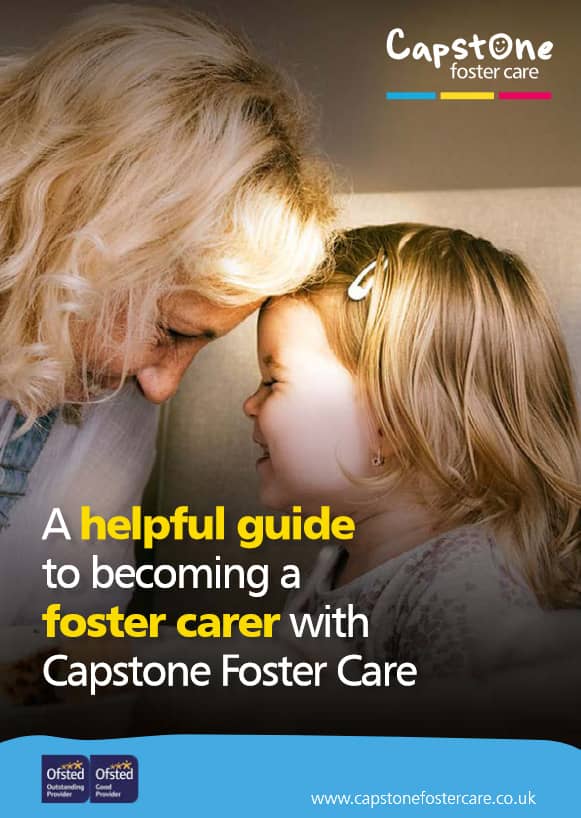


Fostering a disabled child
The role of an independent fostering agency
How to choose a foster care agency
Can I choose who I foster?
What are the benefits of fostering with an independent fostering agency?
What happens when a child is taken into care?
Fostering process: what happens on an initial home visit?
Fostering with local authority vs independent agency
A complete guide to becoming a foster carer
How Are Children in Foster Care Matched with Carers?
Foster Care Budgeting Tips
Becoming A Foster Carer
What is a Care Leaver?
What is a Foster Carer?
Fostering Regulations
How long does it take to become a Foster Carer?
What are the Foster Care requirements?
Changing IFA - Transferring to Capstone
8 reasons why a child may be taken into care
Fostering as a Career
Can you foster if you smoke or vape?
A guide to fostering assessments
LGBTQ+ Fostering
Equality, Inclusion & Anti-discriminatory Practice in Foster Care
What can disqualify you from foster care?
Can you foster if you’re on benefits?
Top transferable job skills to become a foster carer
Fostering as a same sex couple
Fostering while renting
Can you foster if you have mental health issues?
Is there an age limit for fostering in the UK?
Do foster carers get a pension?
How to foster a child: A step by step guide
How do DBS Checks Work?
Can I foster if...?
Mythbusting the top 10 Foster Care Myths
Can I foster if I am disabled?
LGBT Fostering Mythbusting
Can I foster if I have pets?
Can I Foster A Child?
Can I Foster and Work?
Can you Foster with a Criminal Record
Can Single People Foster?
LGBT Family and Foster Care
Fostering across Cultures
Muslim Fostering
Christian Foster Care
Sikh Fostering
Empty Nest Syndrome and Foster Care
Can I Foster?
What is the difference between residential care and foster care?
Fostering Babies and Young Children
What is Kinship Care?
Fostering Babies - Myths
Focusing on Parent & Child Fostering
Fostering Siblings
Fostering Teenagers
Fostering Teenagers - Breaking down the Myths
Fostering Unaccompanied and Asylum Seeking Children
Mother and Baby Foster Placements
Private Fostering
How does therapeutic fostering work?
Young Children Fostering Placements
Difference between short and long-term fostering
Types of self-harm
A Guide to the Foster Care Handbook
Reunification and Birth Parents: A Guide for Foster Carers
What is an EHC Plan? A Guide for Foster Carers
How to prepare a child for becoming a care leaver
Children who foster: impact of fostering on birth children
Fostering LGBTQ+ Youth
How to prepare your home for a foster child
How to help a lonely child: A Guide for Foster Carers
What are the National Minimum Standards for Fostering Services?
10 tips for foster children's education
How to prepare your foster child for secondary school
Tips for coping when foster placements end
Tips for foster parents during Coronavirus
What happens if foster parents get divorced?
5 ways to manage Mother's Day with foster children
Tips for managing foster children's bedtime routines
How to handle foster child bullying
Fostering allowances and the gender pay gap
What discounts can foster carers get?
How to adopt from Foster Care
5 ways to manage Father's Day for children in foster care
8 most common fostering challenges
FosterTalk Membership with Capstone Foster Care
Supporting foster children's contact with birth families
A guide to independent fostering
Keeping Children Safe Online: A Guide For Foster Carers
Movies About Foster Care
Play-based learning strategies for foster carers
A Guide to the Staying Put Program
Why Foster Parent Wellbeing Matters
How to deal with empty nest syndrome
How to recognise signs of depression in foster children
Can you take a foster child on holiday?
Tips and advice on fostering with a disability
10 tips on connecting with your Foster Child
Fostering vs Adoption - What's the difference?
How Fostering can change a future
How to adopt from Foster Care
How to encourage children to read in Foster Care
How to prepare a Foster Child's bedroom
Reading and Storytelling with Babies and Young Children
Supporting Children's Learning
The 20 most recommended books Foster Carers and young people should read
Things you can do when your children leave home
The impact of early childhood traumas on adolescence and adulthood
Anxious Disorders in Foster Children
What is sexual abuse and sexual violence
Foster Child behaviour management strategies
Foster Parent Advice: What to expect in your first year of fostering
Capstone's twelve tips at Christmas
10 celebrities who grew up in Foster Care
Could Millenials be the solution to the Foster Care crisis?
Do you work in Emergency Services?
Form F Assessor and Assessment Training
Foster Care Fortnight
Improving Children's Welfare - Celebrating Universal Children's Day
New Year - New Career - Become a Foster Carer
Young People Charities
If you're fostering for the first time, or simply considering the idea, the prospect of the first year of fostering may be overwhelming.
There may be unknowns such as what to expect, which placements you’ll likely foster and what support will be available to you.
Our guide provides advice on what to expect during your first year as a foster parent, along with some helpful tips for foster parents during their first year from our very own foster carers - Marina and her husband.
Your first foster child could be a long-term, short-term, emergency or therapeutic placement, based on your unique experience and training. There are many reasons why a child would be placed into foster care, which could be a daunting prospect for them during these times.
Your first few weeks as a foster carer is likely to be an adjustment period for the both of you. This may present a vulnerable and emotional time for both you and the child in your care, as you are both on the same learning curve, navigating through this experience together. The first year of fostering can be the most challenging part. Establishing a routine and boundaries based on the needs of the foster child in your care can help you to both adjust to a new environment and surroundings. It is important to remember, each foster child will require different treatment as they may have experienced trauma or developed issues from their past.
As a foster carer with Capstone, you will receive ongoing training and development that will help you along your foster care journey. The initial step during your training will be our ‘Skills to Foster’ course, which covers topics such as first-aid, what foster carers do, understanding the needs of children in foster care and managing challenging behaviour.
You will also get the opportunity to meet our staff, other people and families who are already fostering with Capstone – allowing you to meet like-minded individuals to gain knowledge and experience from to help you on your journey.
Many people interested in fostering wonder what it is like to become a foster parent, why people become foster parents, and what it is like to foster to a child.
To help answer questions for first-time fosterers, one of our foster carers, Marina, has kindly offered to speak to us regarding her fostering experiences.
Patience – things take time. Whether that’s getting the children settled into their new home, establishing a connection and bond with them or being patient when enforcing new routines. Patience is key in successful integration with your new foster care placement.
Time – one of the most important things to be prepared for is how much the placements will take up your time. Not just looking after the children themselves, but the contact time, courses and meetings that you’ll have to attend, too. The stuff behind the scenes should be taken into account – so it’s good to be prepared for that when embarking on the first year of fostering.
Be open – when you get the chance to meet the birth parents, it’s important to be open-minded. Do not look down on them – despite the decisions they’ve made and the life they’ve chosen to lead, they are the child(ren)’s parents – and showing a good relationship between you all can have a positive influence on the children. It’s also good to be prepared to be available for many questions – especially from social workers during the approval process, so being open to this will allow for a more seamless process.
Use your support network – it’s helpful to have a support network of friends and family around you to help. And when they offer to help, Marina’s advice is to take them up on the offer! You can have as many friends and family as you like checked over by social services to ensure they are safe to look after the children – so when family or friends offer, you can take some of that well-needed ‘me time’.
‘Me time’ – one of the most important things to remember is to take time out for yourself. Your time may be filled up with different events and activities that involve taking care of the children – but making time to book a nail appointment, watch a sports event or catch up with friends is important to retain that work-life balance.
Marina, along with her husband have adapted to life as a foster parent. Having had their own three children fly the nest already, Marina and her husband are now looking to change the lives of young people in need.
“We enjoy having children around. We always said once the children have grown up and left, we’d have some time to ourselves and then go on to foster. Fostering has always been on the horizon for us.”
Marina and her husband haven’t been without a placement for long. After just five days from being approved their first foster placement, three girls, entered their lives during December.
“I thought I was prepared for Christmas, turns out, I was not! We bought the girls Christmas presents, laid them out under the tree and on Christmas morning, they walked straight past them and went to have breakfast. They didn’t understand or know what the connotations of Christmas presents were – they’d never experienced it before. They were used to having nothing.”
Creating an environment where your foster children can feel comfortable and safe is important but can also take time. Regarding creating that important connection with foster children, Marina’s advice was:
“Get to know the child – don’t smother them, stand back, and let them come to you for comfort. Me and my husband want the children we have to fit in with our grandchildren’s ages – it would be nice to have that age group so they always have a friend around to speak to.”
When asked if she’d picked up any useful behaviour management techniques, Marina replied:
“The older sibling had a tendency to control the younger sibling.This habit took around 5 months to break – but the older sibling wouldn’t let her sister do anything – get dressed, have a cuddle, speak. It took a while to control this – but by sitting with her and encouraging her not to control her sister, this behaviour was controlled.”
In terms of support, Marina speaks of her experience with the support she’s received from Capstone Foster Care:
“They’re always there at the end of the phone. All the Capstone social workers are – if there are any problems, I know they’ll be there. There’s always someone there to give advice and to speak to. I’ve also been put in touch with another foster parent who’s been fostering for many years – she keeps in touch with me which is great.”
Marina and her husband have said they’ll continue to foster for as long as they can.
Being able to see the changes and development of young people’s lives in your care is one of the most rewarding aspects of fostering, and why many choose to do it as a career. Are you interested in becoming a foster carer? Learn more about the fostering requirements and get in touch with a member of our friendly team today for more foster parent advice and support.
If you’ve got any questions or would like to find out more about fostering with Capstone, fill out the form below.
An experienced fostering advisor from your local area will then be in touch.

Start the conversation today. Our team of friendly advisors are on hand to answer any foster care questions you may have. We can offer you honest and practical advice that can help you decide if becoming a foster carer is the right path for you.


